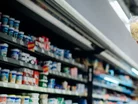Food Industry Backs Sustainability ‘Traffic Light Scheme’

The eco-conscious consumers will be excited to know that a new government pilot scheme is in the works. Like the current colour-coded system on food packaging - establishing a product’s nutrient content - the UK government will implement a traffic light scheme to mark the ‘eco impact’ of products.
A pilot run of the traffic light system is set to take place in autumn this year - as early as September, creating another labelling requirement for food and drink products in the UK. For the first time, each product’s packaging will display an ‘eco score’, which represents its environmental impact - related to carbon footprint - to allow consumers to easily assess the sustainability of the products they purchase.
Who’s On Board?
The scheme was established by Foundation Earth, a new non-profit organisation whose mission is to target environmental concerns in a growing economy. The organisation is backed by the UK government and many big firms in the food industry, including Nestlé and British brands like Sainsbury’s, Marks & Spencer, the Co-operative, and Costa Coffee.
Foundation Earth was idealised by Denis Lynn, an entrepreneur who passed away in May 2021. Launching the organisation has brought together some of the largest contributors in the sector, setting a powerful precedent for the future of sustainable food. Another significant contributor to the cause is the European Commission’s, through its initiative ‘EIT Food’.
“Foundation Earth is the culmination of years of work from our EIT Food consortium and the likes of Oxford University. It will bring a credible and clear front-of-pack labelling system on food products right across the continent,” says Andy Zynga, Chief Executive of EIT.
Why Do We Need ‘Eco Scores’?
Believe it or not, food production creates a significant amount of carbon emissions and contributes to the reduced level of biodiversity. According to the Intergovernmental Panel on Climate Change at the United Nations (UN), the food industry accounts for as much as 37% of greenhouse gas emissions. The UN also states this could increase by 30% before 2050 if actions are not taken.
The labelling scheme was created by Mondra - a sustainability consultancy committed to reducing the food industry's impact on the environment, using data from a paper which was published by researchers at Oxford University (UK) and Agroscope (Switzerland) in 2018. The scheme will promote sustainability in the food and beverage supply chains. The current global push for sustainability and carbon-neutral status inspired the labelling initiative to encourage producers in the industry to be more innovative in their supply chain practices. This labelling system will grade the products on a tier system marked A to G and colour-coded on a scale from red to green - red being the least sustainable and green being the best ranking.
“People want to do what they can to tackle the climate crisis and help the environment. But at the moment, they don’t have the information they need to make more sustainable buying choices. I want to see clearer labelling on carbon and environmental credentials so people can back the brands and products doing the right thing by our planet,” says Labour MP Luke Pollard, the shadow secretary of state for environment, food and rural affairs.



